#XR (Extended Reality)
Explore tagged Tumblr posts
Text
The (open) web is good, actually
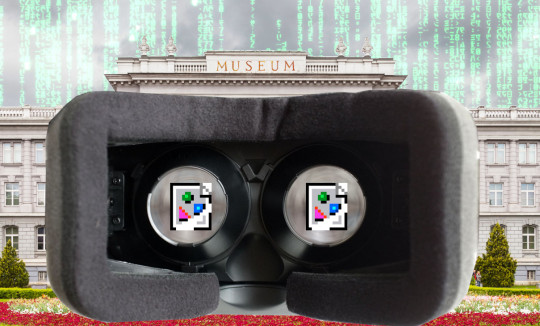
I'll be at the Studio City branch of the LA Public Library tonight (Monday, November 13) at 1830hPT to launch my new novel, The Lost Cause. There'll be a reading, a talk, a surprise guest (!!) and a signing, with books on sale. Tell your friends! Come on down!

The great irony of the platformization of the internet is that platforms are intermediaries, and the original promise of the internet that got so many of us excited about it was disintermediation – getting rid of the middlemen that act as gatekeepers between community members, creators and audiences, buyers and sellers, etc.
The platformized internet is ripe for rent seeking: where the platform captures an ever-larger share of the value generated by its users, making the service worst for both, while lock-in stops people from looking elsewhere. Every sector of the modern economy is less competitive, thanks to monopolistic tactics like mergers and acquisitions and predatory pricing. But with tech, the options for making things worse are infinitely divisible, thanks to the flexibility of digital systems, which means that product managers can keep subdividing the Jenga blocks they pulling out of the services we rely on. Combine platforms with monopolies with digital flexibility and you get enshittification:
https://pluralistic.net/2023/01/21/potemkin-ai/#hey-guys
An enshittified, platformized internet is bad for lots of reasons – it concentrates decisions about who may speak and what may be said into just a few hands; it creates a rich-get-richer dynamic that creates a new oligarchy, with all the corruption and instability that comes with elite capture; it makes life materially worse for workers, users, and communities.
But there are many other ways in which the enshitternet is worse than the old good internet. Today, I want to talk about how the enshitternet affects openness and all that entails. An open internet is one whose workings are transparent (think of "open source"), but it's also an internet founded on access – the ability to know what has gone before, to recall what has been said, and to revisit the context in which it was said.
At last week's Museum Computer Network conference, Aaron Straup Cope gave a talk on museums and technology called "Wishful Thinking – A critical discussion of 'extended reality' technologies in the cultural heritage sector" that beautifully addressed these questions of recall and revisiting:
https://www.aaronland.info/weblog/2023/11/11/therapy/#wishful
Cope is a museums technologist who's worked on lots of critical digital projects over the years, and in this talk, he addresses himself to the difference between the excitement of the galleries, libraries, archives and museums (GLAM) sector over the possibilities of the web, and why he doesn't feel the same excitement over the metaverse, and its various guises – XR, VR, MR and AR.
The biggest reason to be excited about the web was – and is – the openness of disintermediation. The internet was inspired by the end-to-end principle, the idea that the network's first duty was to transmit data from willing senders to willing receivers, as efficiently and reliably as possible. That principle made it possible for whole swathes of people to connect with one another. As Cope writes, openness "was not, and has never been, a guarantee of a receptive audience or even any audience at all." But because it was "easy and cheap enough to put something on the web," you could "leave it there long enough for others to find it."
That dynamic nurtured an environment where people could have "time to warm up to ideas." This is in sharp contrast to the social media world, where "[anything] not immediately successful or viral … was a waste of time and effort… not worth doing." The social media bias towards a river of content that can't be easily reversed is one in which the only ideas that get to spread are those the algorithm boosts.
This is an important way to understand the role of algorithms in the context of the spread of ideas – that without recall or revisiting, we just don't see stuff, including stuff that might challenge our thinking and change our minds. This is a much more materialistic and grounded way to talk about algorithms and ideas than the idea that Big Data and AI make algorithms so persuasive that they can control our minds:
https://pluralistic.net/2023/11/06/attention-rents/#consumer-welfare-queens
As bad as this is in the social media context, it's even worse in the context of apps, which can't be linked into, bookmarked, or archived. All of this made apps an ominous sign right from the beginning:
https://memex.craphound.com/2010/04/01/why-i-wont-buy-an-ipad-and-think-you-shouldnt-either/
Apps interact with law in precisely the way that web-pages don't. "An app is just a web-page wrapped in enough IP to make it a crime to defend yourself against corporate predation":
https://pluralistic.net/2023/08/27/an-audacious-plan-to-halt-the-internets-enshittification-and-throw-it-into-reverse/
Apps are "closed" in every sense. You can't see what's on an app without installing the app and "agreeing" to its terms of service. You can't reverse-engineer an app (to add a privacy blocker, or to change how it presents information) without risking criminal and civil liability. You can't bookmark anything the app won't let you bookmark, and you can't preserve anything the app won't let you preserve.
Despite being built on the same underlying open frameworks – HTTP, HTML, etc – as the web, apps have the opposite technological viewpoint to the web. Apps' technopolitics are at war with the web's technopolitics. The web is built around recall – the ability to see things, go back to things, save things. The web has the technopolitics of a museum:
https://www.aaronland.info/weblog/2014/09/11/brand/#dconstruct
By comparison, apps have the politics of a product, and most often, that product is a rent-seeking, lock-in-hunting product that wants to take you hostage by holding something you love hostage – your data, perhaps, or your friends:
https://www.eff.org/deeplinks/2021/08/facebooks-secret-war-switching-costs
When Anil Dash described "The Web We Lost" in 2012, he was describing a web with the technopolitics of a museum:
where tagging was combined with permissive licenses to make it easy for people to find and reuse each others' stuff;
where it was easy to find out who linked to you in realtime even though most of us were posting to our own sites, which they controlled;
where a link from one site to another meant one person found another person's contribution worthy;
where privacy-invasive bids to capture the web were greeted with outright hostility;
where every service that helped you post things that mattered to you was expected to make it easy for you take that data back if you changed services;
where inlining or referencing material from someone else's site meant following a technical standard, not inking a business-development deal;
https://www.anildash.com/2012/12/13/the_web_we_lost/
Ten years later, Dash's "broken tech/content culture cycle" described the web we live on now:
https://www.anildash.com/2022/02/09/the-stupid-tech-content-culture-cycle/
found your platform by promising to facilitate your users' growth;
order your technologists and designers to prioritize growth above all other factors and fire anyone who doesn't deliver;
grow without regard to the norms of your platform's users;
plaster over the growth-driven influx of abusive and vile material by assigning it to your "most marginalized, least resourced team";
deliver a half-assed moderation scheme that drives good users off the service and leaves no one behind but griefers, edgelords and trolls;
steadfastly refuse to contemplate why the marginalized users who made your platform attractive before being chased away have all left;
flail about in a panic over illegal content, do deals with large media brands, seize control over your most popular users' output;
"surface great content" by algorithmically promoting things that look like whatever's successful, guaranteeing that nothing new will take hold;
overpay your top performers for exclusivity deals, utterly neglect any pipeline for nurturing new performers;
abuse your creators the same ways that big media companies have for decades, but insist that it's different because you're a tech company;
ignore workers who warn that your product is a danger to society, dismiss them as "millennials" (defined as "anyone born after 1970 or who has a student loan")
when your platform is (inevitably) implicated in a murder, have a "town hall" overseen by a crisis communications firm;
pay the creator who inspired the murder to go exclusive on your platform;
dismiss the murder and fascist rhetoric as "growing pains";
when truly ghastly stuff happens on your platform, give your Trust and Safety team a 5% budget increase;
chase growth based on "emotionally engaging content" without specifying whether the emotions should be positive;
respond to ex-employees' call-outs with transient feelings of guilt followed by dismissals of "cancel culture":
fund your platforms' most toxic users and call it "free speech";
whenever anyone disagrees with any of your decisions, dismiss them as being "anti-free speech";
start increasing how much your platform takes out of your creators' paychecks;
force out internal dissenters, dismiss external critics as being in conspiracy with your corporate rivals;
once regulation becomes inevitable, form a cartel with the other large firms in your sector and insist that the problem is a "bad algorithm";
"claim full victim status," and quit your job, complaining about the toll that running a big platform took on your mental wellbeing.
https://pluralistic.net/2022/02/18/broken-records/#dashes
The web wasn't inevitable – indeed, it was wildly improbable. Tim Berners Lee's decision to make a new platform that was patent-free, open and transparent was a complete opposite approach to the strategy of the media companies of the day. They were building walled gardens and silos – the dialup equivalent to apps – organized as "branded communities." The way I experienced it, the web succeeded because it was so antithetical to the dominant vision for the future of the internet that the big companies couldn't even be bothered to try to kill it until it was too late.
Companies have been trying to correct that mistake ever since. After three or four attempts to replace the web with various garbage systems all called "MSN," Microsoft moved on to trying to lock the internet inside a proprietary browser. Years later, Facebook had far more success in an attempt to kill HTML with React. And of course, apps have gobbled up so much of the old, good internet.
Which brings us to Cope's views on museums and the metaverse. There's nothing intrinsically proprietary about virtual worlds and all their permutations. VRML is a quarter of a century old – just five years younger than Snow Crash:
https://en.wikipedia.org/wiki/VRML
But the current enthusiasm for virtual worlds isn't merely a function of the interesting, cool and fun experiences you can have in them. Rather, it's a bid to kill off whatever is left of the old, good web and put everything inside a walled garden. Facebook's metaverse "is more of the same but with a technical footprint so expensive and so demanding that it all but ensures it will only be within the means of a very few companies to operate."
Facebook's VR headsets have forward-facing cameras, turning every users into a walking surveillance camera. Facebook put those cameras there for "pass through" – so they can paint the screens inside the headset with the scene around you – but "who here believes that Facebook doesn't have other motives for enabling an always-on camera capturing the world around you?"
Apple's VisionPro VR headset is "a near-perfect surveillance device," and "the only thing to save this device is the trust that Apple has marketed its brand on over the last few years." Cope notes that "a brand promise is about as fleeting a guarantee as you can get." I'll go further: Apple is already a surveillance company:
https://pluralistic.net/2022/11/14/luxury-surveillance/#liar-liar
The technopolitics of the metaverse are the opposite of the technopolitics of the museum – even moreso than apps. Museums that shift their scarce technology budgets to virtual worlds stand a good chance of making something no one wants to use, and that's the best case scenario. The worst case is that museums make a successful project inside a walled garden, one where recall is subject to corporate whim, and help lure their patrons away from the recall-friendly internet to the captured, intermediated metaverse.
It's true that the early web benefited from a lot of hype, just as the metaverse is enjoying today. But the similarity ends there: the metaverse is designed for enclosure, the web for openness. Recall is a historical force for "the right to assembly… access to basic literacy… a public library." The web was "an unexpected gift with the ability to change the order of things; a gift that merits being protected, preserved and promoted both internally and externally." Museums were right to jump on the web bandwagon, because of its technopolitics. The metaverse, with its very different technopolitics, is hostile to the very idea of museums.
In joining forces with metaverse companies, museums strike a Faustian bargain, "because we believe that these places are where our audiences have gone."
The GLAM sector is devoted to access, to recall, and to revisiting. Unlike the self-style free speech warriors whom Dash calls out for self-serving neglect of their communities, the GLAM sector is about preservation and access, the true heart of free expression. When a handful of giant companies organize all our discourse, the ability to be heard is contingent on pleasing the ever-shifting tastes of the algorithm. This is the problem with the idea that "freedom of speech isn't freedom of reach" – if a platform won't let people who want to hear from you see what you have to say, they are indeed compromising freedom of speech:
https://pluralistic.net/2022/12/10/e2e/#the-censors-pen
Likewise, "censorship" is not limited to "things that governments do." As Ada Palmer so wonderfully describes it in her brilliant "Why We Censor: from the Inquisition to the Internet" speech, censorship is like arsenic, with trace elements of it all around us:
https://www.youtube.com/watch?v=uMMJb3AxA0s
A community's decision to ban certain offensive conduct or words on pain of expulsion or sanction is censorship – but not to the same degree that, say, a government ban on expressing certain points of view is. However, there are many kinds of private censorship that rise to the same level as state censorship in their impact on public discourse (think of Moms For Liberty and their book-bannings).
It's not a coincidence that Palmer – a historian – would have views on censorship and free speech that intersect with Cope, a museum worker. One of the most brilliant moments in Palmer's speech is where she describes how censorship under the Inquistion was not state censorship – the Inquisition was a multinational, nongovernmental body that was often in conflict with state power.
Not all intermediaries are bad for speech or access. The "disintermediation" that excited early web boosters was about escaping from otherwise inescapable middlemen – the people who figured out how to control and charge for the things we did with one another.
When I was a kid, I loved the writing of Crad Kilodney, a short story writer who sold his own self-published books on Toronto street-corners while wearing a sign that said "VERY FAMOUS CANADIAN AUTHOR, BUY MY BOOKS" (he also had a sign that read, simply, "MARGARET ATWOOD"). Kilodney was a force of nature, who wrote, edited, typeset, printed, bound, and sold his own books:
https://www.theglobeandmail.com/arts/books/article-late-street-poet-and-publishing-scourge-crad-kilodney-left-behind-a/
But there are plenty of writers out there that I want to hear from who lack the skill or the will to do all of that. Editors, publishers, distributors, booksellers – all the intermediaries who sit between a writer and their readers – are not bad. They're good, actually. The problem isn't intermediation – it's capture.
For generations, hucksters have conned would-be writers by telling them that publishing won't buy their books because "the gatekeepers" lack the discernment to publish "quality" work. Friends of mine in publishing laughed at the idea that they would deliberately sideline a book they could figure out how to sell – that's just not how it worked.
But today, monopolized film studios are literally annihilating beloved, high-priced, commercially viable works because they are worth slightly more as tax writeoffs than they are as movies:
https://deadline.com/2023/11/coyote-vs-acme-shelved-warner-bros-discovery-writeoff-david-zaslav-1235598676/
There's four giant studios and five giant publishers. Maybe "five" is the magic number and publishing isn't concentrated enough to drop whole novels down the memory hole for a tax deduction, but even so, publishing is trying like hell to shrink to four:
https://pluralistic.net/2022/11/07/random-penguins/#if-you-wanted-to-get-there-i-wouldnt-start-from-here
Even as the entertainment sector is working to both literally and figuratively destroy our libraries, the cultural heritage sector is grappling with preserving these libraries, with shrinking budgets and increased legal threats:
https://blog.archive.org/2023/03/25/the-fight-continues/
I keep meeting artists of all description who have been conditioned to be suspicious of anything with the word "open" in its name. One colleague has repeatedly told me that fighting for the "open internet" is a self-defeating rhetorical move that will scare off artists who hear "open" and think "Big Tech ripoff."
But "openness" is a necessary precondition for preservation and access, which are the necessary preconditions for recall and revisiting. Here on the last, melting fragment of the open internet, as tech- and entertainment-barons are seizing control over our attention and charging rent on our ability to talk and think together, openness is our best hope of a new, good internet. T
he cultural heritage sector wants to save our creative works. The entertainment and tech industry want to delete them and take a tax writeoff.
As a working artist, I know which side I'm on.

If you'd like an essay-formatted version of this post to read or share, here's a link to it on pluralistic.net, my surveillance-free, ad-free, tracker-free blog:
https://pluralistic.net/2023/11/13/this-is-for-everyone/#revisiting

Image: Diego Delso (modified) https://commons.wikimedia.org/wiki/File:Museo_Mimara,_Zagreb,_Croacia,_2014-04-20,_DD_01.JPG
CC BY-SA 4.0 https://creativecommons.org/licenses/by-sa/4.0/
#pluralistic#ar#xr#vr#augmented reality#extended reality#virtual reality#museums#cultural preservation#aaron cope#Museum Computer Network#cultural heritage#glam#access#open access#revisiting#mr#mixed reality#asynchronous#this is for everyone#freedom of reach#gatekeepers#metaverse#technofeudalism#privacy#brick on the face#rent-seeking
188 notes
·
View notes
Video
tumblr
here’s a process vid of me making a magical little dragon diorama on my desk :)
Patreon | Insta | Twitter | Ko-fi | YouTube | TikTok | Twitch
#art#artists on tumblr#3d art#digital art#ar#augmented reality#xr#extended reality#mr#mixed reality#figmin xr#vr#virtual reality#i'm finally getting around to doing a bunch of video work#all the vids/gifs on our website are getting updated#and i'm compiling a reel for a very special pitch........ 🤞#god i'm gonna have so many announcements i need to make#i should just put them in a big Announcement Masterpost at this point ghsdkghsk#things!!!! they're happenin!!!!!
127 notes
·
View notes
Photo

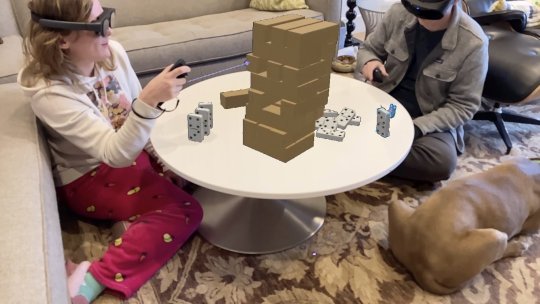
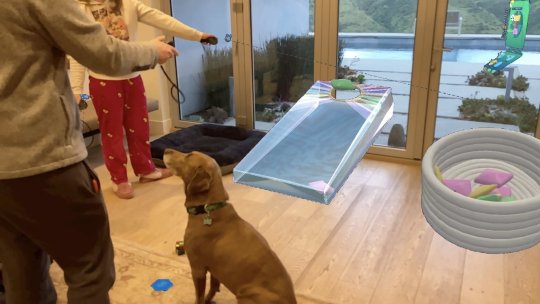

I worked overtime so much on this project that I forgot to post it (IT KEEPS HAPPENING) but here’s some screenshots from a video I made about how we might use XR to reduce material waste in the future!
I created most of the 3D models you see in these images, and I also assigned physics to them so that they behave realistically when touched.
for the rest I just downloaded them - because everything published to Figmin XR is creative commons. believe it or not, I’m not the only holographic toymaker out there!! 🤯
on the topic of downloading objects I also made this, because I could not resist the opportunity to meme:

#figmin xr#ar#augmented reality#vr#virtual reality#3d art#tech#technology#xr#extended reality#honorary guest appearance by: my boyfriend!#i shared a preview of the final video showing all this in action on the patreon#and will post the final version here if i'm able to#we need to contact the contest organizers at awe to see if we're allowed to share it before the contest ends#it came out wonderfully though and i'm very proud of it#i think with enough time this tech could actually really help eliminate so much plastic and single-use item waste!!#i feel truly privileged to be working on something with such amazing potential
143 notes
·
View notes
Note
I just had a thought looking at Starfucker Super Trans 2000! A lot of the stuff I’ve seen you work on in AR has been human scale—I assume for practical reasons.
But theoretically, there’s no real reason you shouldn’t be able to create something and then scale it up to be big, right?
My first thought, of course, being that you could theoretically draw a version of Starfucker Super Trans in Figmin XR and then scale it up to actual size! (Though depending on the scale of the game you might need a nice field or parking lot for that XD)
My second thought being that if AR does become more commonplace like you dream, what an educational opportunity! I mean, it’s one thing to say “a blue whale is as long as two school buses put together”, and another to actually take your kid outside and plop down a life-sized model right in front of their eyes!
I think you’re right, AR really does have potential to make a lot of things more accessible. After all, technology tends to become cheaper and more available over time. Maybe someone can’t travel across the country to see a big museum, but they can rent an AR set and plop down a smithsonian dinosaur skeleton in a nearby parking lot!
And going back to the blue whale; giving kids these experiences with animals they might not be able to see otherwise can help give them an appreciation for nature, so they’re more motivated to preserve what’s right around them as they grow up! Say, draw them in with whales, and then show them the kind of fish that live in rivers around them and how beautiful they are too! Make a field trip of it!
AR just holds so much potential as a tool to introduce new experiences, I think. The way you use it especially gives me hope; your work has a feel of wonder to it.
One of my biggest concerns about AR is that it will have a similar effect as the internet, where we rely too much on it, moving too much from the physical world to the digital. You see studies as well that are finding developmental problems coming from not having enough interactions with the physical world. But, the way you mix your work with nature, talk about how while it could be used to replace some toys—making it easier to fulfill the remaining demand sustainably—it also can serve as an introduction for people to find interests they want to pursue more seriously with physical components… I really think we can introduce it to good effect.
I've been sitting on this ask for ages because I wanted to record a video showing a life-sized mech in response to it - but I just wanna say
YES, YES, A MILLION TIMES YES to ALL of this!!!!! 😭💖💖💖
messages like these are what makes my work so worth it, because every word of what you said here is EXACTLY what I'm trying to communicate with everything I do.
early on, the founder of Figmin XR (Javier Davalos) understood that people can't just be told that this technology will change the world for the better - they have to realize it for themselves. so he applied for the first Magic Leap grant, won it, and then got to work creating a software to help people do just that.
everything you've mentioned above is either already in development or already starting to be implemented in schools, museums, workshops - even summer camps!! and I know this because I've been working directly with the people organizing these things, helping to teach them how to use Figmin to teach others. :)
the future will be more digital than it already is today, yes, but that doesn't automatically make it a dystopia. I've said it before and I'll say it again - technology is just a tool, and there are many, many people creating new ways to use it for good.
#ar#augmented reality#vr#virtual reality#xr#extended reality#like literally i am going to send this entire message to the rest of the figmin xr team because it will bring them so much joy#to see the message behind their work getting through so clearly#but yeah. you're 100% right in all of your thinking and many people share it#tldr: THERE'S STILL GOOD IN THE WORLD MR FRODO#AND IT'S WORTH FIGHTING FOR!!!
16 notes
·
View notes
Text
This really is a simulation or at least the stupidest possible timeline. The machines will take over using - wait for it - DARQ technology.
3 notes
·
View notes
Text
What is Immersive Technology? A Comprehensive Guide to Immersive Technology 2025

Immersive technology refers to the suite of technologies that create a simulated or enhanced reality by engaging one or more of the human senses. These technologies enable users to interact with digital environments in ways that feel natural and intuitive, often blurring the line between the physical and virtual worlds. As we approach 2025, immersive technology is poised to revolutionize industries such as education, healthcare, entertainment, retail, and more.
The Core Components of Immersive Technology
Virtual Reality (VR): VR immerses users in entirely digital environments, often requiring specialized headsets like the Oculus Quest or HTC Vive. It’s widely used in gaming, training simulations, and virtual tours.
Augmented Reality (AR): AR overlays digital elements onto the physical world. Think of applications like Pokémon GO or AR filters on social media. Devices such as smartphones, tablets, and AR glasses enable AR experiences.
Mixed Reality (MR): Combining elements of VR and AR, MR allows real and virtual objects to interact seamlessly. For example, Microsoft’s HoloLens is a popular MR device.
Extended Reality (XR): XR is an umbrella term that encompasses VR, AR, and MR, signifying any form of immersive technology that extends or modifies reality.
360-Degree Content: This involves panoramic images or videos that allow users to explore a scene from all angles. Commonly used in virtual tours and real estate.
Why Immersive Technology Matters in 2025
The year 2025 is expected to mark a significant milestone for immersive technology, driven by advancements in hardware, software, and connectivity. Here’s why it’s gaining momentum:
Enhanced Hardware: Lightweight, affordable headsets and AR glasses are making immersive experiences more accessible.
5G Connectivity: Faster internet speeds and lower latency enable seamless streaming of high-quality immersive content.
AI Integration: Artificial intelligence enhances the realism of simulations, making them more responsive and interactive.
Increased Adoption: Businesses and educational institutions are increasingly leveraging immersive technology for training, marketing, and engagement.
Applications of Immersive Technology in 2025
Education: Immersive classrooms powered by VR and AR offer students engaging ways to learn complex subjects, from history to medical procedures.
Healthcare: Surgeons can practice in VR environments, while AR aids in diagnostics and minimally invasive procedures.
Entertainment: The gaming and film industries are adopting VR and AR to deliver highly engaging experiences.
Retail: Virtual try-ons and immersive shopping experiences are transforming the way consumers interact with brands.
Remote Work: Virtual offices and AR collaboration tools are bridging the gap for distributed teams.
Benefits of Immersive Technology
Enhanced User Engagement: Immersive experiences capture attention and improve memory retention.
Cost-Effective Solutions: Training and prototyping in virtual environments reduce expenses and risks.
Accessibility: Immersive tools make specialized knowledge and experiences more widely available.
Challenges of Immersive Technology
While the future looks promising, several hurdles must be overcome:
High Development Costs: Creating immersive experiences can be expensive.
Privacy Concerns: The data collected by immersive devices raises security issues.
User Fatigue:��Prolonged use of immersive technologies may lead to discomfort.
Immersive Technology 2025: What’s Next?
The immersive technology landscape is evolving rapidly. By 2025, we can expect:
Better Accessibility: Affordable devices will make these technologies more mainstream.
Seamless Integration: Immersive tools will become a natural part of daily life and work.
Advanced Applications: From smart cities to personalized healthcare, the possibilities are limitless.
How to Prepare for Immersive Technology 2025
Stay Updated: Follow industry trends and updates to understand the latest advancements.
Upskill: Learn skills like 3D modeling, AR development, or immersive content creation.
Adopt Early: Businesses should consider pilot projects to test the feasibility of immersive solutions.
Conclusion
Immersive technology is reshaping the way we interact with the world, offering endless possibilities across industries. As we move toward 2025, the integration of VR, AR, and MR into daily life will become increasingly seamless. By staying informed, upskilling, and adopting these technologies early, individuals and organizations can unlock their full potential. The future of immersive technology is bright, and it’s time to embrace the transformation.
Content Source - https://medium.com/@priyankapandey08/what-is-immersive-technology-a-comprehensive-guide-to-immersive-technology-2025-eefa55b8f22a
#Immersive Technology 2025#Virtual Reality#Augmented Reality#Mixed Reality#Extended Reality#Immersive Experiences#Future of Technology#AR and VR Trends#XR Applications#Immersive Technology Benefits#tagbin#writers on tumblr#artificial intelligence#technology
0 notes
Text
In recent years, Virtual Reality (VR) and Augmented Reality (AR) have made significant strides in transforming industries, education, entertainment, and even healthcare. While both technologies are often grouped under the term extended reality (XR), they represent distinctly different experiences. This detailed comparison will explore both VR and AR in terms of their definitions, differences, applications, advantages, challenges, and potential future directions.
#Virtual Reality (VR)#Augmented Reality (AR)#Extended Reality (XR)#VR technology#AR applications#VR vs AR#Immersive experiences#AR devices#VR gaming#AR in retail#VR training simulations#AR navigation#VR headsets#AR education#Mixed Reality (MR)#VR healthcare applications#AR in marketing#AR glasses#VR development#Future of VR and AR
0 notes
Text

XR, atau extended reality, merupakan istilah umum yang mencakup semua teknologi imersif yang menggabungkan dan memperluas pengalaman dunia fisik dan virtual.
Dalam konteks ini, XR meliputi berbagai teknologi seperti augmented reality (AR), virtual reality (VR), dan mixed reality (MR).
Dengan kemajuan teknologi yang pesat, XR bertujuan untuk menciptakan pengalaman yang lebih interaktif dan mendalam bagi pengguna, merubah cara kita berinteraksi dengan lingkungan sekitar dan informasi digital.
#augmented reality#extended reality#mixed reality#teknologi pelatihan#teknologi perkantoran#virtual reality#xr
0 notes
Text
0 notes
Text
Extended Reality Market is estimated to Witness High Growth Owing to Increasing Adoption Across Industries
Extended reality (XR) refers to all real-and-virtual combined environments and human-machine interactions generated by computer technology and wearables. It includes augmented reality (AR), virtual reality (VR), and mixed reality (MR) and allows the users to interact with digital content and the physical world. XR delivers disruptive experiences by seamlessly merging the digital and physical worlds, offering an immersive viewer experience. Major application areas of XR technologies include gaming, entertainment, retail, education, healthcare, design and engineering, and more. The seamless blending of the physical and digital worlds enhances immersion, presence and experience for the users. The global extended reality market is valued to grow from US$ 46.3 Billion in 2023 to US$ 197.3 Billion by 2030, at a CAGR of 23% during the forecast period (2023-2030).
Key Takeaways Key players operating in the Extended Reality are Meta Inc., HTC Corporation, Unity Technologies, Microsoft Corporation, Samsung Electronics Co., Ltd., Magic Leap, Sony Corporation, Vuzix Corporation, Apple Inc, Niantic Inc., Northern Digital Inc., Snap Inc., SoftServe, and Accenture. The key opportunities in the extended reality market include increased investments from technology giants, evolving consumer preferences and capabilities, growing demand across vertical industries and development of 5G networks. Rapid technological advancements, growing focus on collaboration and shared experiences are driving the adoption of VR and MR solutions globally. The adoption of XR technologies is growing across regions. North America currently dominates the Extended Reality Market Size owing to large technology companies and early adoption. However, Asia Pacific is expected to witness the highest growth aided by government initiatives for digital transformation and increasing investments in emerging technologies from China, Japan, South Korea and others. Market Drivers The increasing adoption across industries is driving the growth of the extended reality market. Major industries like gaming, entertainment, healthcare, education and manufacturing are leveraging XR solutions to enhance customer experiences, create immersive training environments and drive productivity. Growing investments from technology giants are focusing on developing innovative XR applications and solutions. This is further fueled by the increasing processing power of devices and developments in 5G that are able to deliver low latency remote experiences.
PEST Analysis Political: The extended reality market sees increasing government support and funding for research and development projects. Regulations regarding data privacy and security are also evolving as the technology advances. Economic: Extended reality technologies promise to significantly boost productivity across various sectors like manufacturing, education, healthcare, etc. This would positively impact the broader economy over time. Social: Younger generations are more receptive to immersive technologies. More users are adopting recreational and social virtual experiences on consumer-focused extended reality platforms. Technological: Integration of 5G, artificial intelligence and computer vision are expected to radically improve the user experiences offered by extended reality. Graphics capabilities are also advancing to generate photo-realistic virtual worlds. The APAC region accounts for the largest share of the global extended reality market in terms of value. China, Japan and South Korea are major countries driving the rapid adoption of augmented and virtual reality solutions in industrial, commercial and consumer segments across APAC. As the economywide digital transformation gains momentum, extended reality technologies find increasing application across industries like manufacturing, healthcare and education. North America represents the fastest growing regional market for extended reality globally. Presence of leading technology companies as well as significant venture capital funding are supporting R&D and innovation. Growing entrepreneurship in the fields of gaming, retail and entertainment is supporting the deployment of extended reality platforms and services. The region exhibits early adoption of new immersive technologies among both enterprise and individual users.
Get more insights on Extended Reality Market
About Author:
Ravina Pandya, Content Writer, has a strong foothold in the market research industry. She specializes in writing well-researched articles from different industries, including food and beverages, information and technology, healthcare, chemical and materials, etc. (https://www.linkedin.com/in/ravina-pandya-1a3984191)

#Coherent Market Insights#Extended Reality Market#Extended Reality#XR#Augmented Reality#Virtual Reality#Mixed Reality#Immersive Technology#AR#VR#MR#Digital Reality#Immersive Experiences#Spatial Computing
0 notes
Text
How Extended Reality Is Enhancing User Engagement. #XR is helping bring businesses closer to their users through cutting-edge engagement concepts. Here are a few examples: https://www.inc.com/shama-hyder/how-extended-reality-is-enhancing-user-engagement.html
0 notes
Text
finally got around to recording and subtitling my performance at the Augmented World Expo 😤 it's 6 minutes long, but worth the watch if you wanna understand more about what I do!
this was part of a competition centered around using XR technology (virtual reality, augmented reality, spatial computing - whatever you want to call it) to fight climate change.
we were the only ones competing in the category of Replace - and I gave this performance showing how Figmin XR, a software that can create free-to-download digital objects (aka 'digital twins'), could be used to massively reduce material waste in the future.
AR glasses and haptic feedback technologies are still in their infancy, and they're not YET at the stage where they can be as ubiquitous as smartphones - but as someone lucky enough to work with them every day, let me tell you:
this stuff is powerful. being able to to see, hear, and FEEL digital objects in 3D space changes the wiring of your brain. it's truly indescribable unless you've experienced it yourself, but everything feels real, like it's there with you, especially if it's something you've brought into existence with your own two hands. I share my virtual inventory with my friends - we play with confetti together, paint together, make things together - all in-person, the entire process feeling so natural that we forget all of it is just made out of light.
this is the entirety of what Figmin's mission is about - empowering people to re-learn the joy of playing (which so many of us don't have the time or money for anymore!), while also reducing material waste in the process.
once this new form of 3D computing finally becomes accessible to the public (and it will - it's too magical to be forgotten), we could see a huge cultural shift of innovation similar to what happened with the rise of the internet and personal computers in the first place.
and, like the original PC, it's only going to get better once it does reach people. I'm not going to say that every person out there will use XR for good (we all know how corporate greed goes by now), but that doesn't mean it's inherently bad or scary.
all technology is still just a tool, and we can still use it to connect with one another, to learn, to create... and, hopefully, to change the world for the better.
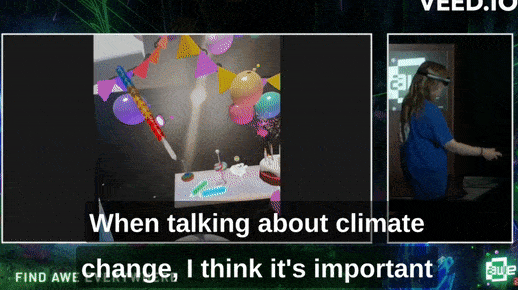
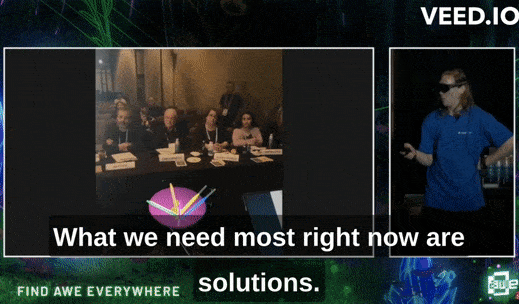
#art#digital art#artists on tumblr#3d art#vr#virtual reality#ar#augmented reality#xr#extended reality#awe 2023#figmin xr#tilt brush#i understand why we didn't win (we are ahead of the curve. this solution isn't accessible yet)#but i was STILL RIGHT AND SHOULD SAY IT#BECAUSE VERY FEW OTHER PEOPLE ARE!!!!#anyways i've been recovering from this event+mold damage since june#and have mostly just been playing in figmin with my friends which is why there hasn't been much new art lately#but i have a lot of video to edit now!#multiplayer has been incredibly magical and i can't wait to share what me and my friends have been making#i'm gonna keep sharing and creating magical wizard shit!!!!!!!! and i will not stop!!!!!!!!!!!!!
39 notes
·
View notes
Video
tumblr
Long time no post! I’ve been super busy lately. 😭
This is another tutorial video I made for the in-app help section! It covers everything you need to know about using your Figmin account to share scenes and manage web links.
#figmin xr#augmented reality#ar#gamedev#game dev#mixed reality#extended reality#vr#virtual reality#NEW ACTUAL DEVLOG COMING..... SOON#it's gonna be a mega update since it's been so long fhsjkghsk
15 notes
·
View notes
Text
These XR Glasses Gave Me a Vision Pro Experience for a Fraction the Cost (VITURE Pro XR Glasses Review) #viturepro #viture #xr #ar #vr #SteamDeck #switch #display #review
#xr#vr#mr#ar#extended reality#viture#viture pro#viture pro xr#display#nintendo switch#steam deck#review
0 notes
Text
The Daylight Moon
Photography Exhibition Review The Daylight Moon | Francis Cai M16 Artspace | 19 April – 12 May 2024 Francis Cai, a fine art photographer and xR (Extended Reality) film director, is 25 years old and based in Sydney. He graduated from Whitecliffe College of Arts and Design with a Bachelor of Fine Arts and from the University of Sydney with a Master of Moving Image. After graduating, he…

View On WordPress
#Aphelios#Extended Reality#Francis Cai#Hyperrealist Movement#Hyperreality#M16 Artspace#The Daylight Moon#xR
0 notes
Text
Extended Reality (XR) Market - Analysis, Size and Forecast 2023-2027
Originally published on Technavio: Extended Reality (XR) Market Analysis North America,APAC,Europe,South America,Middle East and Africa - US,China,Japan,Germany,UK - Size and Forecast 2023-2027
**Extended Reality (XR) Market Analysis**
The Extended Reality (XR) Market is poised for significant growth across key regions including North America, APAC, Europe, South America, and the Middle East and Africa. The forecast period from 2023 to 2027 anticipates substantial expansion in this innovative sector.
**North America:** With the US at the forefront, North America is expected to lead the XR market during the forecast period. Factors such as robust technological infrastructure, widespread adoption of XR technologies across industries including gaming, healthcare, and education, and the presence of key XR solution providers contribute to the region's dominance. Moreover, the increasing investments in research and development initiatives and the growing demand for immersive experiences further bolster market growth in North America.
**APAC:** The Asia-Pacific (APAC) region, particularly China and Japan, is poised to witness rapid growth in the XR market. Factors such as the proliferation of smartphones, increasing internet penetration, and government initiatives to promote XR technologies drive market expansion in the region. Additionally, the rising adoption of XR in industries such as manufacturing, retail, and entertainment presents lucrative opportunities for market players in APAC.
**Europe:** Europe, including countries like Germany and the UK, is expected to experience significant growth in the XR market. The region's strong emphasis on technological innovation, coupled with increasing investments in XR research and development, propel market growth. Furthermore, the growing adoption of XR solutions for training, simulation, and virtual collaboration across various industries contributes to market expansion in Europe.
**South America:** South America is emerging as a promising market for XR technologies, with countries like Brazil leading the way. Factors such as the increasing demand for immersive entertainment experiences, the adoption of XR in advertising and marketing, and the rising investments in virtual and augmented reality solutions drive market growth in the region. Moreover, the growing interest from industries such as healthcare, architecture, and tourism further fuels market expansion in South America.
**Middle East and Africa:** The Middle East and Africa (MEA) region is witnessing gradual adoption of XR technologies, with countries like the UAE and South Africa exploring opportunities in this space. Factors such as government initiatives to promote digital transformation, investments in smart city projects, and the growing interest from sectors like education and healthcare contribute to market growth in MEA. Additionally, the increasing availability of XR content and applications is expected to drive market expansion in the region.
To Learn deeper into this report , View Sample PDF
Overall, the Extended Reality (XR) market across North America, APAC, Europe, South America, and the Middle East and Africa is poised for robust growth during the forecast period, driven by factors such as technological advancements, increasing adoption across industries, and growing consumer demand for immersive experiences.
For more information please contact.
Technavio Research
Jesse Maida
Media & Marketing Executive
US: +1 844 364 1100
UK: +44 203 893 3200
Email: [email protected]
Website: www.technavio.com/
0 notes